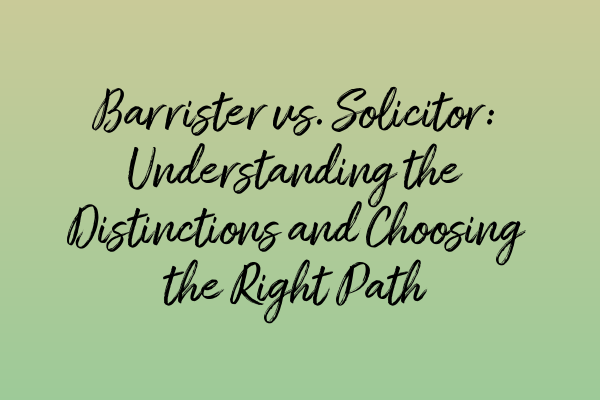A Barrister vs. Solicitor: Understanding the Distinctions and Choosing the Right Path
Choosing a career in law is an exciting journey filled with numerous opportunities and challenges. Aspiring legal professionals often find themselves faced with the decision of becoming either a barrister or a solicitor. While both professions are crucial components of the legal system, they differ in terms of their roles, responsibilities, and training.
In this article, we will delve into the distinctions between barristers and solicitors, helping you gain a deeper understanding of each profession. Whether you are considering a career in law or simply curious about the legal world, this article will provide valuable insights to help you make an informed decision.
Let’s start by exploring the role of a barrister. Barristers are legal professionals who specialize in advocacy and representation in court. They are often seen as expert legal advisers and are typically involved in cases that require in-depth legal analysis, research, and oral argument. Barristers are known for their exceptional courtroom skills, eloquence, and ability to present complex legal arguments.
On the other hand, solicitors are legal professionals who work directly with clients, providing legal advice and assistance. They are often the first point of contact for individuals seeking legal help and can handle various legal matters, including property transactions, wills, and drafts of legal documents. Solicitors also often manage and coordinate the entire legal process, including negotiations, settlements, and interactions with both clients and other legal professionals.
Now that we understand the primary roles of barristers and solicitors, let’s discuss the educational and training paths required to pursue each career.
To become a barrister, aspiring professionals must complete a law degree, followed by the Bar Professional Training Course (BPTC), and then a period of pupillage. The BPTC equips individuals with essential advocacy, drafting, and legal research skills necessary to excel in the courtroom. Pupillage provides aspiring barristers with the opportunity to work alongside experienced barristers, gaining practical experience and further honing their skills.
On the other hand, individuals seeking to become solicitors typically follow a different educational and training path. They must complete a law degree, the Legal Practice Course (LPC), and then a period of training, known as a training contract. The LPC focuses on practical legal skills, such as client interviewing, legal research, and drafting legal documents. Training contracts provide aspiring solicitors with valuable hands-on experience in different practice areas under the supervision of qualified solicitors.
Now that we understand the distinctions between barristers and solicitors and the educational requirements for each, let’s delve into the factors to consider when choosing the right path.
One crucial factor to consider is whether you prefer courtroom advocacy or client-focused work. If you thrive on the excitement of the courtroom, enjoy arguing legal principles and presenting arguments, a career as a barrister may be the right fit for you. However, if you prefer building relationships with clients, providing comprehensive legal advice, and managing a wide range of legal matters, becoming a solicitor may be the better choice.
Another factor to consider is the work environment. Barristers are often self-employed, working in chambers alongside other barristers. This provides independence and flexibility but also requires self-motivation and business acumen. Solicitors, on the other hand, can work in various settings, such as law firms, government agencies, or corporate legal departments. Consider your preferred work environment and how it aligns with your career goals and lifestyle.
Additionally, while both barristers and solicitors provide essential legal services, the remuneration and career progression may differ. Barristers often have higher earning potential, especially as they develop a specialty and establish themselves in the legal community. Solicitors, on the other hand, may have a more structured and predictable career progression, with opportunities for advancement within law firms or corporate organizations.
Ultimately, choosing between a career as a barrister or a solicitor depends on your personal interests, skills, and goals. It’s important to thoroughly research and consider all aspects of each profession before making a decision. Speaking with legal professionals and gaining practical experience through internships or work placements can also provide valuable insights and help you make an informed choice.
In conclusion, a career in law offers diverse opportunities, and the choice between becoming a barrister or a solicitor is an important decision. Both professions play crucial roles in the legal system, but they differ in terms of their roles, responsibilities, and training. By understanding these distinctions and considering your own interests and goals, you can make an informed decision about the path you wish to pursue.
Remember, whether you ultimately choose to become a barrister or a solicitor, the legal profession offers immense rewards, challenges, and the opportunity to make a real difference in people’s lives.
Related Articles:
– SQE Prep Made Easy: Strategies and Resources
– SQE Prep: Tips and Tricks to Excel in Criminal Law
– Terrorism and Criminal Law: Balancing National Security with Justice
– Cross-Examination Techniques: Mastering the Art of Questioning
– Private Prosecutions: Exploring Non-Governmental Prosecutions in Criminal Cases


Leave a Reply